The popularity of PEX in residential and commercial construction has produced an influx of engineered polymer (EP) F1960 expansion fittings claiming to be “just the same as Uponor ProPEX®”. However, these lower-quality F1960 fittings are putting systems and contractors at significant risk for leaks or poor performance. Uponor ProPEX fittings are certified by a third-party Read more
ProPEX
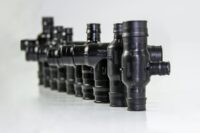
The popularity of PEX in residential and commercial construction has produced an influx of engineered polymer (EP) F1960 expansion fittings claiming to be “just the same as Uponor ProPEX®”. However, these lower-quality F1960 fittings are putting systems and contractors at significant risk for leaks or poor performance.
Uponor ProPEX fittings are certified by a third-party agency, NSF International, to prove the product is designed and manufactured to the ASTM F1960 standard. In addition, ProPEX fittings also include additional internal quality testing that extends beyond ASTM F1960 standard requirements to provide a higher-quality product.
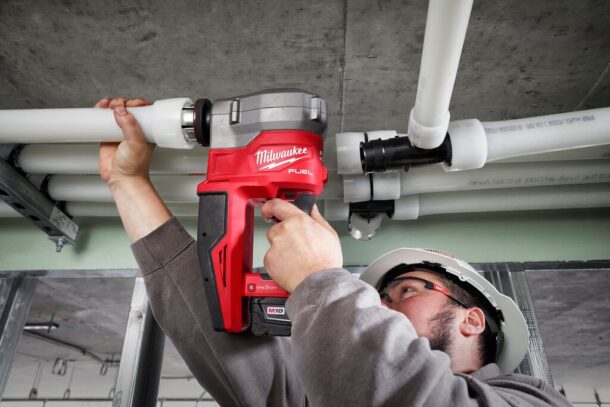
Some suppliers claim their fittings are compliant to F1960, which means, in their opinion, they meet the standard. However, there is no third-party agency to confirm that compliance. This confusion between certification and compliance is resulting in PEX piping installations with lower-quality connections that are putting systems at risk for failure and jeopardizing installers’ reputations.
Uponor has performed a random sampling of these lower-quality F1960 EP fittings and found them to have a reduced internal diameter — up to 50% in some instances. Additionally, Uponor has received claims for failed connections that, after investigation, were found to be different suppliers’ low-quality F1960 fittings.
Many generic F1960 expansion fittings have a thinner sealing barb and weaker tube stops compared to ProPEX fittings. Those differences can result in leaks that cost time and money to repair — and also damage a contractor’s reputation.
It is important to be vigilant when ordering and purchasing F1960 fittings. Ensure you are getting the superior quality of ProPEX that comes with a 25-year transferable limited warranty when used as a system with Uponor PEX-a pipe and ProPEX rings.
To learn more about the differences in ProPEX and how it can impact your business, visit uponor.com/propex.

When it comes to hydronic hot-water heating or chilled-water piping installs, speed and accuracy counts. That’s why Uponor is introducing the new ProPEX® brass threaded adapter that connects ¾” PEX to ½” male NPT. This new threaded adapter is made from high-quality brass for durable, consistent performance in hydronic piping applications. Pair it with Uponor Read more
When it comes to hydronic hot-water heating or chilled-water piping installs, speed and accuracy counts. That’s why Uponor is introducing the new ProPEX® brass threaded adapter that connects ¾” PEX to ½” male NPT.
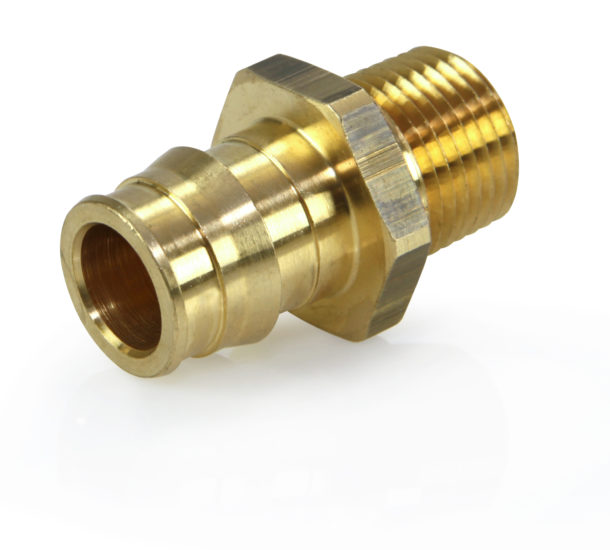
Q5527550 | ProPEX Brass Male Threaded Adapter, ¾” PEX x ½” NPT
This new threaded adapter is made from high-quality brass for durable, consistent performance in hydronic piping applications. Pair it with Uponor ProPEX opposing-port tees, and you have an efficient solution for back-to-back unit configurations.
Need a different configuration? Uponor has a comprehensive offering of transition fittings for converting ProPEX connections to male thread, female thread, copper tubing sweat, copper fitting sweat, and copper fitting press for fast, easy, reliable transitions in hydronic piping applications.
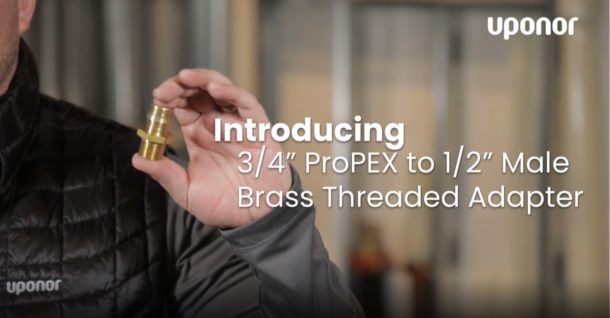
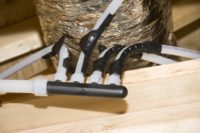
Two directors discuss how switching from PEX-b pipe with crimp-style fittings to Uponor PEX-a pipe with ProPEX® expansion connections made a big impact on their business. Kimbel Mechanical Systems is one of the nation’s preeminent mechanical contractors, specializing in plumbing, HVAC, and electrical work in more than a dozen states on both sides of the Read more
Two directors discuss how switching from PEX-b pipe with crimp-style fittings to Uponor PEX-a pipe with ProPEX® expansion connections made a big impact on their business.
Kimbel Mechanical Systems is one of the nation’s preeminent mechanical contractors, specializing in plumbing, HVAC, and electrical work in more than a dozen states on both sides of the country — from Montana to Massachusetts. Headquartered in Fayetteville, Ark., Kimbel currently maintains 12 regional offices, including six in Arkansas, three in Colorado, and one each in Tennessee, Missouri, and Oklahoma.
The company was originally established as a one-person, new-residential plumbing shop in 1984 in northeast Ohio. A decade later, founder Miles Kimbel relocated and reconstituted his firm 900 miles southwest to pursue new opportunities in Arkansas. Fast-forward a few more years, and Miles’ son Rob Kimbel took over the reins, broadening the company’s reach to include mid- to large-scale multifamily projects, as well as single-family residential.
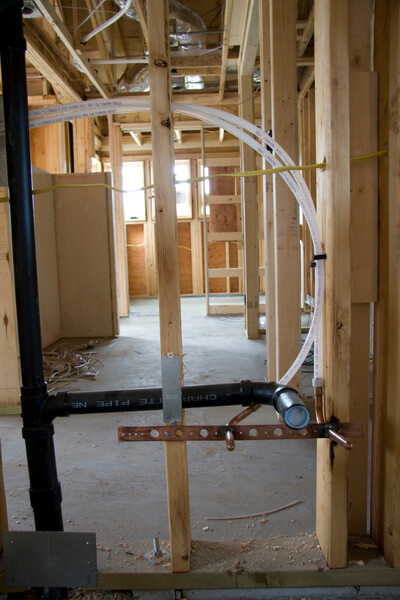
Residential plumbing with Uponor PEX-a and ProPEX fittings.
While the residential side of the business is still mainly involved in single-family work, the commercial side encompasses multifamily projects, hotels, schools, military housing, assisted-living facilities, and other types of large-scale structures. The company’s total number of employees exceeds 500, and they also rely on a large pool of subcontractors for their commercial work.
Several years ago, directors in both halves of Kimbel’s business found themselves struggling with “huge” and mounting warranty problems caused by damaging pipe leaks — damaging to the properties in which the product had been installed, as well as to the company’s professional reputation.
As a result, they decided to begin transitioning away from PEX-b pipe with crimp-style fittings and start using Uponor PEX-a pipe with ASTM F1960 ProPEX® expansion connections for their plumbing projects.
Hear Kimbel’s journey firsthand from Ryan Pinkerton, Director of Operations in Colorado and Tennessee, along with his colleague Mark Evans, Director of Pre-Construction – Commercial Housing, as they detail the factors that drove the company-wide shift, as well as the beneficial impact Uponor PEX-a and the ProPEX expansion method have subsequently had on both sides of their business.
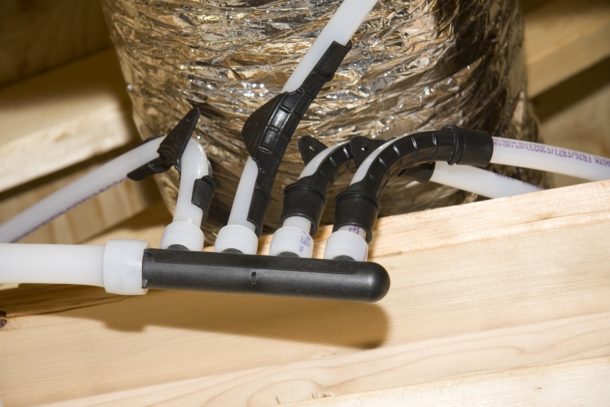
Residential plumbing with Uponor PEX-a and ProPEX fittings.
Residential: Ryan Pinkerton, Director of Operations, Colorado and Tennessee
What is the primary piping product your company uses?
PEX is the known method among the single-family homebuilders we work with today. We might use Schedule 80 CPVC for pipe runs larger than two inches — mains and so forth. But, the majority of our single-family housing work is PEX.
How long have you been using PEX?
We began using PEX not long after I entered the plumbing trade 15 years ago. At that time, for our residential work, we were using PEX-b from another brand. However, we were having so many leaks with the crimp-style connections.
What were some of the issues you encountered with PEX-b crimp connections?
Over-calibrating was an issue. Because you can over-calibrate crimpers, it created a weak spot in the fitting that can crack under use. Also, if you position the crimp ring too far back, it can hold under the air test, but blow off when you turn on the water. The problems were huge, ongoing, and cost us hundreds of thousands of dollars in repairs.
Why did you switch to Uponor PEX-a pipe and the ProPEX® fitting system?
We needed to decrease our warranty costs to repair crimp connections as well as improve the relationships with the homebuilders we served. We also liked the increased water flow that the Uponor system provided. Crimp-style connections reduce the diameter of the PEX-b pipe and, as a result, lower the flow rate. That’s not the case with the ProPEX expansion-type fitting on PEX-a pipe. That has been a key, positive factor for us with the switch.
Commercial: Mark Evans, Director of Pre-Construction – Commercial Housing
Why did your commercial team choose to make the switch?
We use contract installers, and we had so many different people doing the work, it was hard to maintain quality with crimp. The Uponor ProPEX expansion method and the simplicity of the expansion tool for making PEX-a connections worked a lot better for us.
Were there issues with other piping products?
We had numerous leak issues with our larger water mains where we used CPVC at the time. CPVC joints are only as good as the installer who glues them. Once we learned Uponor offered PEX-a in larger diameters, that opportunity to reduce our water-main leak problems also helped drive the switch to Uponor.
Was it difficult for your workers to switch?
Uponor came to our job sites to train our crews on the ProPEX connection method. This training was quick and simple. Once we got everyone on board, the leaks went down drastically. Additionally, our contract plumbing installers are now faster and more productive with Uponor PEX-a. Although most of our contract installers work only for us, we still pay them for piecework. As a result, installation speed really matters for these independent contractors. They know that if you are not fast, you are not profitable. Thanks to the training they received, these contract installers are now familiar working with PEX-a. They have learned to install it quickly without mistakes.
To learn more about Uponor training opportunities for your team, visit uponor.com/training. To learn how Uponor can help bring greater productivity and performance to your residential or commercial projects, visit uponor.com.
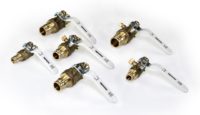
Delivering higher value for residential projects and helping commercial projects meet stringent demands, Uponor North America (Uponor) now offers a newly redesigned line of ProPEX® ball valves for PEX-a plumbing and hydronic distribution applications. The residential and commercial offerings provide superior quality and performance at a competitive cost. Manufactured from premium, lead-free, dezincification-resistant brass, these full-port ball Read more
Delivering higher value for residential projects and helping commercial projects meet stringent demands, Uponor North America (Uponor) now offers a newly redesigned line of ProPEX® ball valves for PEX-a plumbing and hydronic distribution applications.
The residential and commercial offerings provide superior quality and performance at a competitive cost. Manufactured from premium, lead-free, dezincification-resistant brass, these full-port ball valves feature positive tube stops that ensure installers insert the valve into the pipe far enough without overextension. The valves all feature a blowout-proof stem design to ensure a lifetime of trusted reliability that professionals have come to expect from Uponor. In addition, the ASTM F1960 connection method offers a solid, strong seal without the need for glues, torches, or fire watch, providing greater safety and cost savings on job sites.
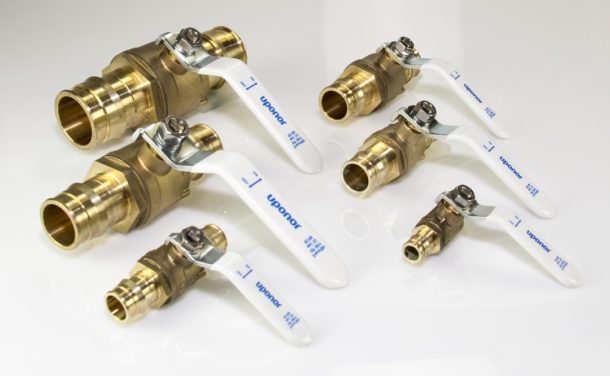
ProPEX LF Brass Commercial Ball Valve
The residential valves are available in sizes from ½” to 1″ and feature a chrome-plated ball along with a stop and drain (waste) option. The commercial valves are available in sizes from ½” to 2″ and feature a stainless-steel ball and stem along with stem extension kits to accommodate insulation thicknesses up to 2″.
“Uponor is committed to providing customers with products they can trust,” says Brett Boyum, vice president, Marketing and Offerings, at Uponor. “These newly redesigned ball valves deliver on quality and reliability while providing greater value to help customers meet the performance and budget demands of today’s residential and commercial projects.”
Both ProPEX ball valve offerings are backed by a five-year warranty and meet IPC, UPC, and IRC building codes in addition to being listed to NSF 14, 61, 359, and 372 for residential and commercial construction. To learn more about this newly redesigned offering, visit https://go.uponor.info/ballvalves.
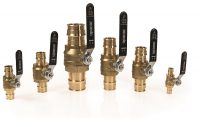
For a more cost-effective ball valve option for ASTM F1960 PEX-based hydronic heating and cooling applications, look to Uponor’s ProPEX® brass ball valves. These commercial-grade, full-port ball valves are available in ½” to 2″ sizes and are appropriate for non-potable PEX piping systems containing up to 50 percent propylene glycol. The valves feature blow-out-proof stems Read more
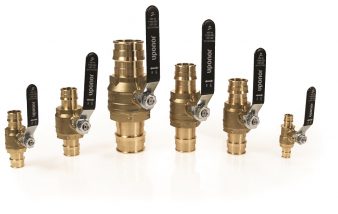 For a more cost-effective ball valve option for ASTM F1960 PEX-based hydronic heating and cooling applications, look to Uponor’s ProPEX® brass ball valves. These commercial-grade, full-port ball valves are available in ½” to 2″ sizes and are appropriate for non-potable PEX piping systems containing up to 50 percent propylene glycol. The valves feature blow-out-proof stems and are available with stem extension kits to accommodate up to 2″ of insulation. They are code-compliant and listed to ANSI/NSF 14 and cNSFus-rfh and tested to ASTM F877, ASTM F1960, CSA B137.5 and NSF 359.
For a more cost-effective ball valve option for ASTM F1960 PEX-based hydronic heating and cooling applications, look to Uponor’s ProPEX® brass ball valves. These commercial-grade, full-port ball valves are available in ½” to 2″ sizes and are appropriate for non-potable PEX piping systems containing up to 50 percent propylene glycol. The valves feature blow-out-proof stems and are available with stem extension kits to accommodate up to 2″ of insulation. They are code-compliant and listed to ANSI/NSF 14 and cNSFus-rfh and tested to ASTM F877, ASTM F1960, CSA B137.5 and NSF 359.
Visit uponorengineering.com to download CAD and BIM design files for fast and easy specification and design.
